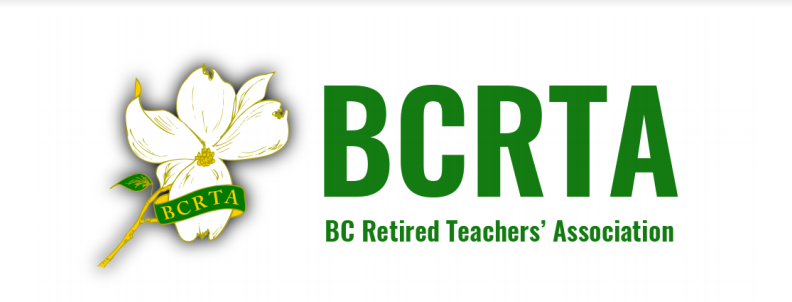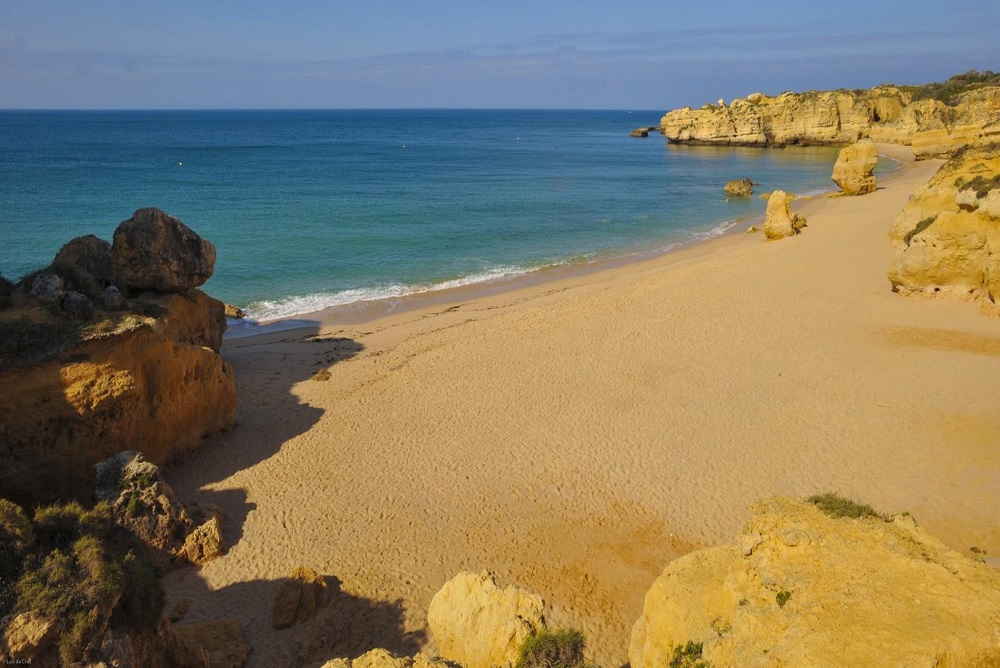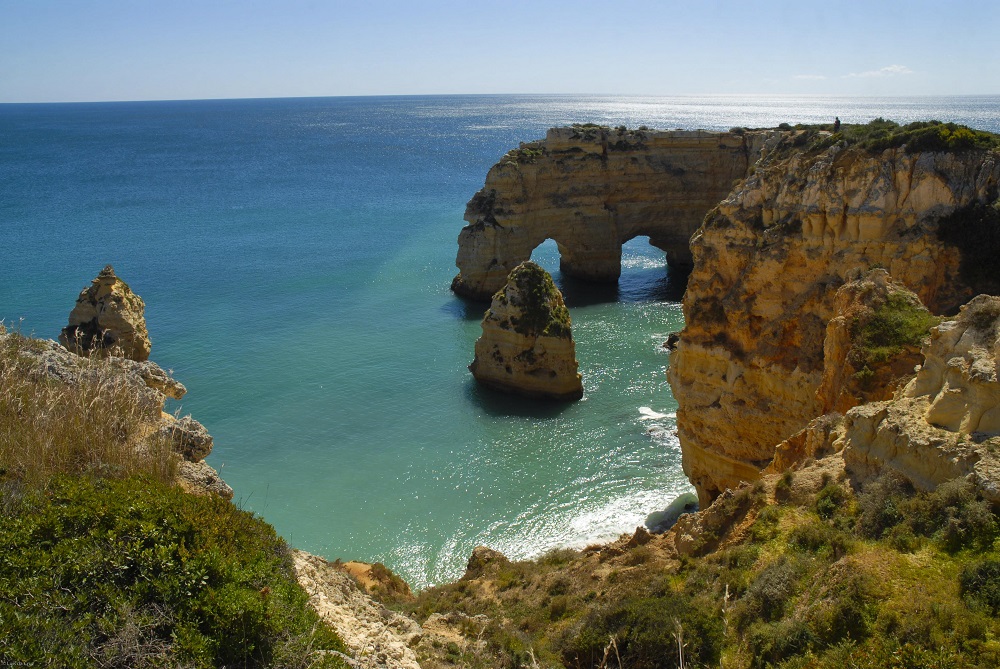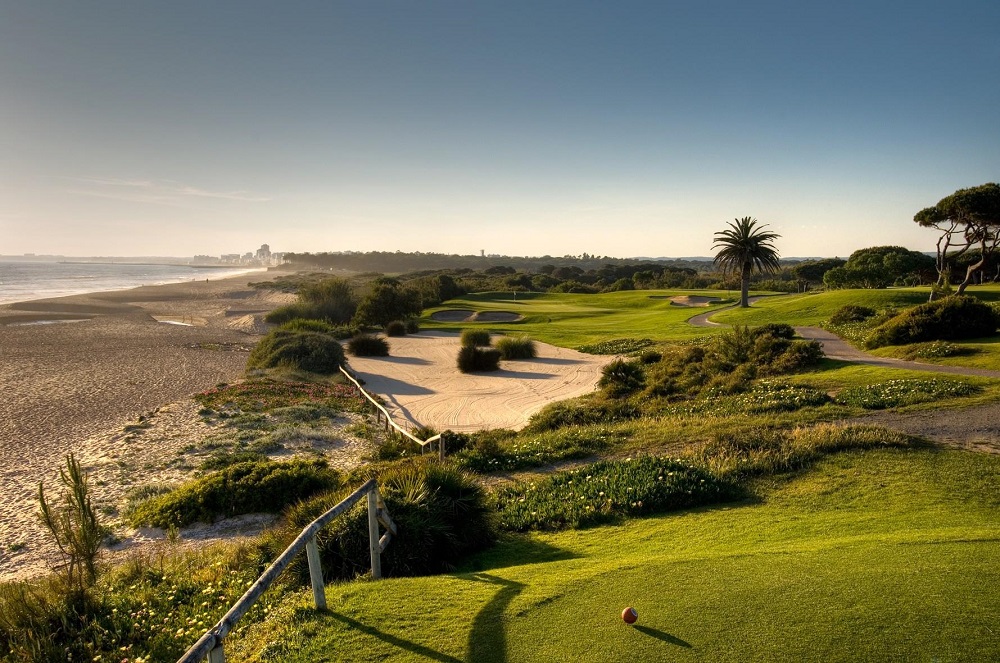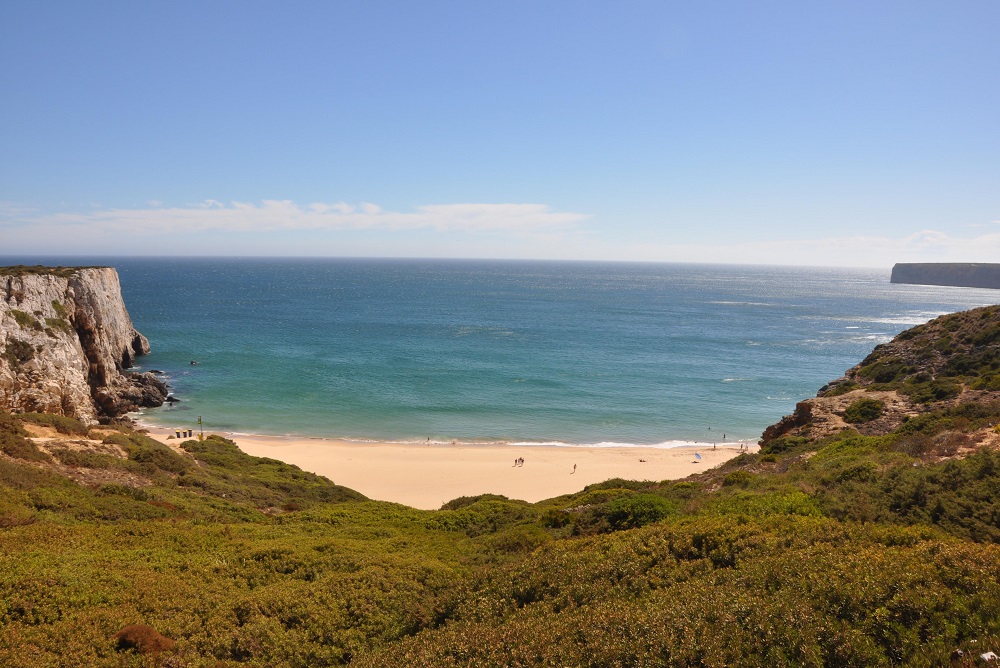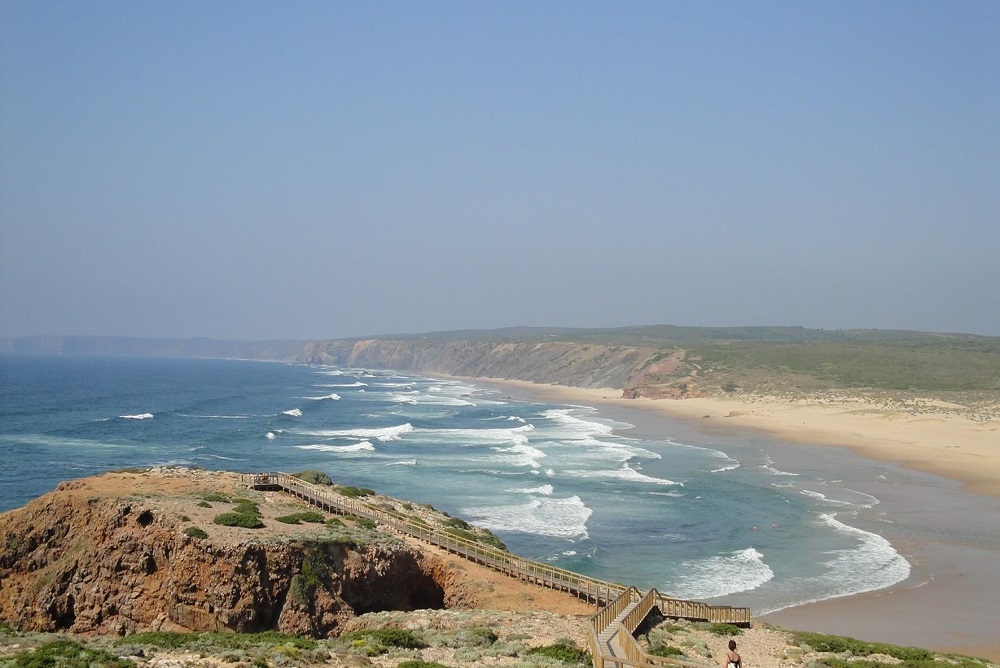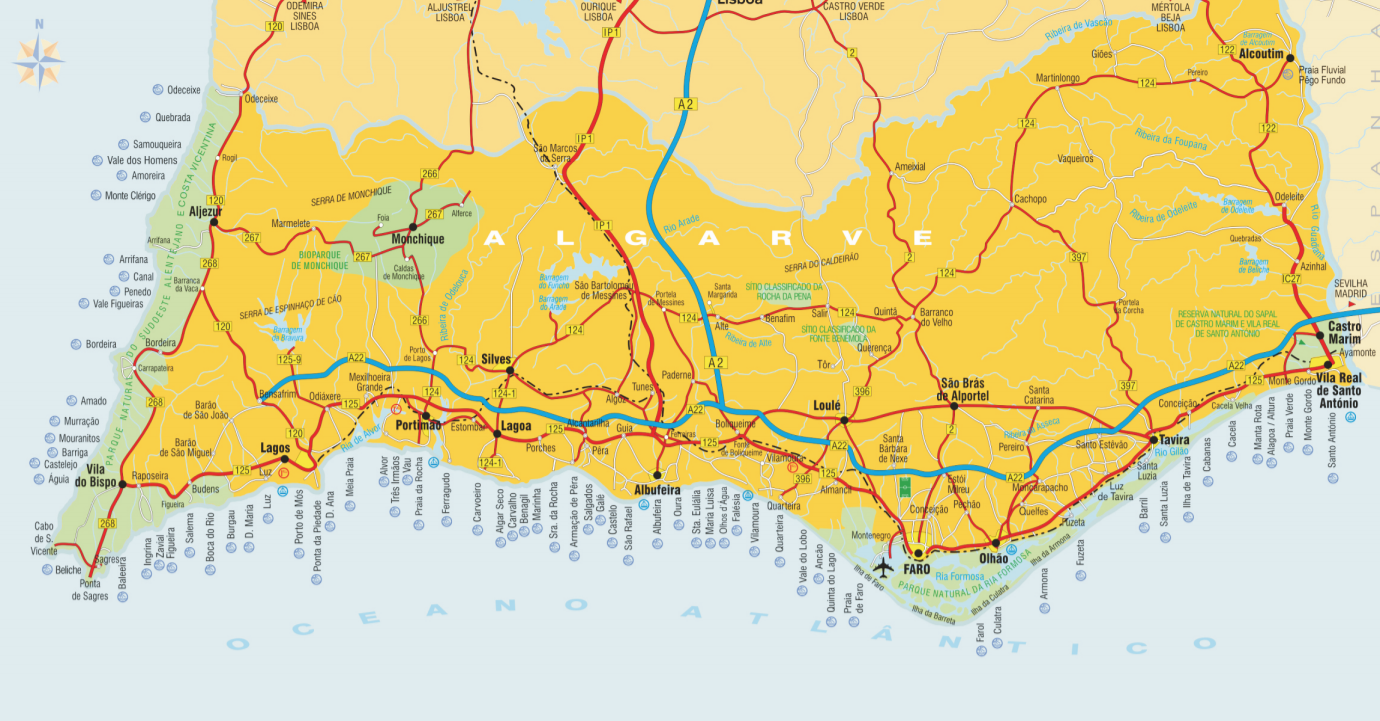
Europe’s most famous secret…
We are sure you have already heard about it. Perhaps a friend told you about its magnificent beaches. Maybe you saw a report about its typically Mediterranean cuisine. Or it could be that you simply came across a page like this one, which highlights the history, culture and friendliness of those who are used to giving visitors the warmest of welcomes.
But there is an Algarve that you haven’t discovered yet: the Algarve of the people who live here.
Only they can show you the hidden-away villages, the most unspoilt walking trails, the best restaurants to eat xarém (maize porridge), the deserted beaches, the places where flamingos take to the wing or the perfect course for your first-ever round of golf.
Listen to our biggest secrets. And then whisper them, time and time again, in the ears of your family and friends. Because life is so much better when you share it.
To book a trip in the Algarve and Portugal to receive a special member rate, simply contact us today at info@tripmerchant.com. Whether it is a long stay vacation, private / tailor made or guided tour, our team of travel experts will provide you with a memorable experience in this incredible area of Europe.
Visit the Algarve Tourism Website by clicking here to learn more: www.visitalgarve.pt/en/
We had an exciting presentation on Algarve, Portugal on October 20, 2020. If you missed this online presentation, you can learn all about this incredible region from our “local” partners by clicking the button below to view. Type in this password to access: Algarve123!
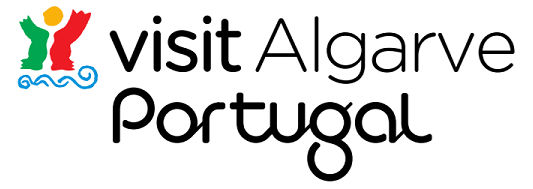
- Sun & Beaches
- Golf
- Nature & Landscape
- Cycling & Walking
- Gastronomy & Wine
- Culture & Tradition
- Health & Wellness
- Nautical
- Business
- Sport & Adventure
- Fun & Entertainment
- Motorhome
- Cultural Routes
Visit this page, https://www.visitalgarve.pt/en/menu/22/be-inspired.aspx, to learn about each reason why to visit Algarve!
In the Algarve, your holidays will take on a historical flavour.
All around the region, you will find the chance to discover some of the charms and secrets of Portugal’s history, which time has not yet managed to erase.
Spending your holidays in the Algarve also provides an opportunity for travelling in time, finding numerous testimonies to the different peoples and cultures that have come together throughout the history of this region.
From traces of the Roman presence to evidence of the long legacy of Muslim times, from the Christian reconquest to the epic period of the Portuguese discoveries, you will find all kinds of reasons for rediscovering the signs of a quite distinctive historical past.
The evidence of the human settlement of the Algarve dates back to time immemorial. Examples of this presence are to be found in the Neolithic remains from many thousands of years ago and the more recent, but no less interesting, Roman archaeological sites, now open to visitors.
Any trip into the region’s past and its valuable history should also include a visit to the various archaeological museums, displaying a vast heritage that lies waiting to be discovered. As the home to a range of ancient civilisations, the Algarve was also visited by many other peoples, inevitably brought to the region by the immense sea that bathes its shores.
More than five centuries of Moorish influences left their indelible imprint upon the region, beginning with its actual name: Al-Gharb, meaning The West. The long Moorish occupation of the territory, which lasted from the 8th to the 13th century, is still to be noted in the names of the towns and villages, in the region’s agriculture, in the architecture of the monuments, the lacework patterns of the balconies, roof terraces and chimneys, or the whitewashed houses still to be seen in many Algarve villages.
At that time, Silves was the central focus of the region because of its strategic geographical location.
In the mid-13th century, the Algarve was the last part of Portugal to be reconquered from Muslim rule. After a long period of forward pushes and backward retreats, the Christian reconquest enjoyed the valuable collaboration of the Knights of the Order of St. James, led by Dom Paio Peres Correia. The result was that, in the reign of Dom Afonso III, the Arab presence in the Algarve was brought to an end and the region was joined to the kingdom of Portugal.
Besides Silves, the cities of Tavira and Faro, the present-day capital of the Algarve, were definitively conquered from the Moors. This marked the foundation of the Kingdom of Portugal and the Algarves.
Later, in the early 15th century, the beginning of the Portuguese maritime expansion brought a new lease of life to the Algarve and its people. Since then, Lagos and Sagres have remained forever linked to Prince Henry the Navigator and the Portuguese Discoveries. Even today, at the headland known as the Ponta de Sagres, a giant stone finger can be seen pointing towards the Atlantic Ocean in a clear allusion to the courage of the Algarve navigators, such as Gil Eanes, who set sail across the seas in search of new worlds to give to the world.
Many marks of this remote past, which is still very much present in the soul of the Algarve’s inhabitants, are to be found scattered all around the region.
Paying a visit to Aljezur, Lagos, Silves, Faro, Tavira, Castro Marim and Alcoutim means discovering the grandeur of Portuguese history, its people and their traditions, in each museum, church, fort and castle of the region.
United and diverse; this is the Algarve. A tourist destination comprising 16 municipalities, each with its own identity, charming scenery and special stories to share.
Municipalities include: Albufeira, Alcoutim, Aljezur, Castro Marim, Faro, Lagoa, Lagos, Loulé, Monchique, Olhão, Portimão, São Brás de Alportel, Silves, Tavira, Vila do Bispo, Vila Real de Santo António
Learn more about the region’s municipalities, explore what they have to offer, choose the places you definitely want to visit and work out your holiday itinerary:https://www.visitalgarve.pt/en/menu/35/municipalities.aspx
The Algarve is divided into three large strips, each of great scenic beauty:
– The coastline (litoral), where most of the region’s economic activity is centred. The Algarve coast is highly diverse; you will find steep cliffs dropping sharply into the sea, extensive stretches of sand, lagoons with many inlets, marshes, dunes and more. The rocks are predominantly sedimentary, such as sandstone and conglomerates. Morphologically, the coastline has a low altitude and mostly consists of flat terrain such as grasslands and plains;
– The barrocal is the transitional zone between the coast and the uplands, and consists of limestone and schist rocks. Also known as beira-serra (“edge of the uplands”) it is, traditionally, the main supplier of the Algarve’s agricultural produce, including the renowned medronho brandy, honey and cork;
– The uplands (serra) occupy 50% of the territory. They consist of schist rocks and some granite. The main upland ranges are the Serra do Espinhaço de Cão, the Serra de Monchique, where the highest point in the Algarve is located at 902 metres, and the Serra do Caldeirão, also known as Mú.
The Algarve’s geographical location confers special bioclimatic conditions on the region. The climate is temperate with Mediterranean characteristics. The sun shines for over 3,000 hours a year and the average annual rainfall is low.
The most important activity sector is the tertiary sector (commerce and services) due to the main economic activity – tourism.
The Algarve has one of the best climates in Europe, all year round. With little rainfall, generally occurring between the months of November and March, and plenty of sunshine, the Algarve offers outstanding weather conditions for year-round tourism.
Temperatures are high in summer, which is one reason why the Algarve is a top “sun and sea” destination and an authentic paradise for beachgoers. The region’s beaches, stretching for many kilometres along the coast, consist of fine, golden sand, and the sea is calm, with temperatures of around 22ºC in the summer.
Due to its terrain and geographical location, the Algarve is influenced by various climates: from the continent of Europe to the north of Africa, and from the Atlantic Ocean to the Mediterranean Sea. Maximum temperatures vary between 15ºC and 31ºC over the course of the year. In winter, temperatures do not drop below zero and the sunny days draw many tourists from the colder countries in northern Europe at this time of year.
Average temperatures
Air temperature in summer: 24ºC to 29ºC
Air temperature in winter: 15ºC to 18ºC
Sea temperature in summer: 21ºC to 24ºC
Sea temperature in winter: 15ºC to 19ºC
Due to its peripheral location, the Algarve enjoys good transport connections, both internally with the other Portuguese cities and externally with the rest of the world. Various national airlines have regular flights to the Algarve, making Faro a busy international airport.
The Algarve also benefits from a good road network, composed of motorways, trunk roads and a range of secondary roads, making the journey comfortable and efficient whether you’re travelling by bus or driving in a rented car.
Information about Eletronic Toll here.
Rail transport is another alternative for visitors to the region. The Portuguese rail service (CP – Comboios de Portugal) has a vast network of trains to places all over the country.
International Access
Faro Airport
Tel.: 289 800 800 (General)
Tel.: 289 800 801 (Flight information until midnight)
Tel.: 289 800 617 (Flight information after midnight)
www.ana-aeroportos.pt
International Access by Road
N431 (Huelva, Spain) / A22 – (Via do Infante, Portugal)
Port of Portimão
Tel.: 282 400 680
National Access
Roads
IC1, N2, N120, N122
Trains
“Alfa Pendular”: fully equipped, fast and comfortable trains.
Intercity trains: connections to various cities in Portugal, such as Lisbon-Algarve
Inter-regional trains.
Buses
Express service: from various locations
Access in the Algarve
Main road links
A22 – (Via do Infante), N125
Trains
Services between Lagos and Vila Real de Santo António
Feel at home in the Algarve. Here, you will find everything you need to know about the region so that you can simply relax during your holiday and feel just as Algarvean as us. Check opening hours, legal information, driving information, useful contacts, transport and much more before you travel.
HEALTH:
Faro Red Cross – 289 899 900
Hospitals
Faro – 289 891 100
Lagos – 282 770 100
Portimão – 282 450 330
Emergency / S.O.S
In the event of an emergency, dial 112, the national emergency service, free of charge. The call can be answered in three languages: Portuguese, English and French. If you require medical assistance, you should go to the local Health Care Centre (Centro de Saúde). The Hospital Emergency Services must only be used in serious cases.
CURRENCY:
The currency used in Portugal is the Euro, as in most other countries of the European Union (Spain, France, Luxembourg, Germany, Italy, Ireland, Belgium, Holland, Finland, Austria and Greece). One of the advantages of having a single currency is that you do not have to change any money because you can use the Euro in all of these countries.
There are eight coins: 1, 2, 5, 10, 20 and 50 cents and 1 and 2 Euros. All coins have one side that is common to all twelve countries, whilst the other side differs from country to country.
Did you know that…?
The Euro is divided into 100 cents.
In Portugal, the national side of the Euro coins displays the royal seal of Dom Afonso Henriques.
Banknotes
There are seven banknotes. The front and back of each note is the same for all twelve participating countries: 5, 10, 20, 50, 100, 200 and 500 Euros.
Did you know that…?
The seven periods of European architectural history are represented on the banknotes. The bridges symbolise the dynamics of cooperation and communication, whilst the gateways symbolise the European spirit of openness.
Each banknote has a dominant colour for easy identification.
The larger the banknote’s value the greater its size.
Credit and debit cards
Most Portuguese shops and businesses accept credit cards: Visa, Amex, Eurocard, Euro-Cheque, Diners Club and MasterCard.
There are a lot of cash machines all over the country. These cash machines are identified with the “MB” abbreviation.
SERVICES:
Banks
Monday to Friday: 08:30 – 15:00
Closed on Saturdays and official holidays.
Post Offices
Monday to Friday: 09:00 – 18:00
Central post offices and those at airports are open on Saturdays.
Chemists
Monday to Friday: 09:00 – 13:00 / 15:00 – 19:00
Saturday: 09:00 – 13:00
Shops
Monday to Friday: 09:00 – 13:00 / 15:00 – 19:00
From January to November, shops close at 13:00 on Saturdays,; in December, they are open Monday to Saturday, from 09:00 to 13:00 and from 15:00 to 19:00. There are also many shopping malls with shops that are open from 10:00 to 24:00.
For lunch from 12:00 to 15:00 and for dinner from 19:00 to 22:00.
Wednesday to Sunday: 10:00 to 18:00
Tuesdays: 14:00 – 18:00
Closed on Mondays; Good Friday; Easter Sunday; 1 May and 25 December.
National Palaces
Closed on Wednesdays.
TRANSPORT:
How to Get About In the Algarve
Trains
There are stations in all main towns between Lagos and Vila Real de Santo António
Urban transport
Public transport in all main areas
Taxis
Colour: beige or black and green
Fare lists must be displayed inside each taxi.
Supplementary charges: increase of 20% at night between 22:00 and 06:00, and at weekends; fixed supplementary charge for any luggage transported in the boot.
Car hire
Car rental services (with or without driver) can be found in all major centres, hotels and travel agencies
Compulsory requirements: Valid identity card (European Union citizens), valid passport (other nationalities), minimum age 21. Compulsory insurance.
ACCOMMODATIONS:
It’s easy to find somewhere to stay for your dream holiday in the Algarve. There is a wide variety of excellent accommodation, apartments and villas for rent, campsites and pousadas, all around the region.
Tourist accommodation is classified as follows:
Hotels: offering a diversified supply of services and the possibility of meals; classified from 1 to 5 stars, depending on the quality of the facilities and services provided, as well as the location of the hotel.
Aparthotels: offering all the services of a hotel, as well as greater independence; classified from 2 to 5 stars.
Pousadas (State-run Luxury Hotels): located in areas of exceptional beauty or in ancient monasteries, castles or palaces; divided into four categories: Historical, Historical Design, Nature and Charm. Accommodation is best booked in advance (ENATUR – Pousadas de Portugal: www.pousadas.pt).
Tourist Villages: accommodation classified from 3 to 5 stars; located in areas that include various services and support facilities.
Tourist Apartments: for those who wish to enjoy complete autonomy; classified from 2 to 5 stars.
Resorts: Resorts are a good choice for those wishing to enjoy a variety of leisure services and equipment in the same area with access to different accommodation options, either in the form of a 4 or 5-star hotel or another type of tourist establishment.
Tourism in a Manor House: Those who prefer to receive accommodation in a family environment can choose to stay in manor houses, palace-like houses or residences of recognised architectural, historic or artistic value, in either a rural or urban setting.
Tourism in the Country: Offering accommodation in country residences exhibiting the distinctive features of their particular rural setting, Tourim in the Country enables tourists to enjoy more direct contact with the local populations, their customs and habits, as well as with Nature itself. These accommodation units may be classified as:
- Country Houses – these are houses located in villages and rural areas that still preserve the original design, building materials and other typical features of the local architecture;
- Agricultural Tourism – this consists of accommodation on a farm, where tourists can take part in the agricultural work if they so wish;
- Rural Hotels – classified from 3 to 5-star, these hotels are to be found in rural areas, respecting the original layout and architectural characteristics of the surrounding region.
Camping: Campsites are divided into two groups, classified from 1 to 4 stars: public campsites, open to all those who pay at the entrance; and private campsites where admission is restricted to members or special beneficiaries. These latter sites must display the letter “P”.To stay overnight, campers will need to identify themselves either through their passport, identity card or a camper’s card issued by a national organisation or the “carnet camping” from the F.I.C.C (Fédération Internationale de Camping et Caravanning).
Nature Tourism: Whenever a tourist establishment is located in a nature protected area or in an area classified as being of natural value, it is included in the category of Nature Tourism, a practice that is recognised by the Institute for the Conservation of Nature and Biodiversity. In this case, equipment and services must be provided that enable tourists to enjoy and interpret nature.
Note: In all forms of hotel accommodation, restaurants and travel agencies, a complaints book is always available
Request Algarve Brochure for further Ideas & Inspiration by emailing us at info@tripmerchant.com!
